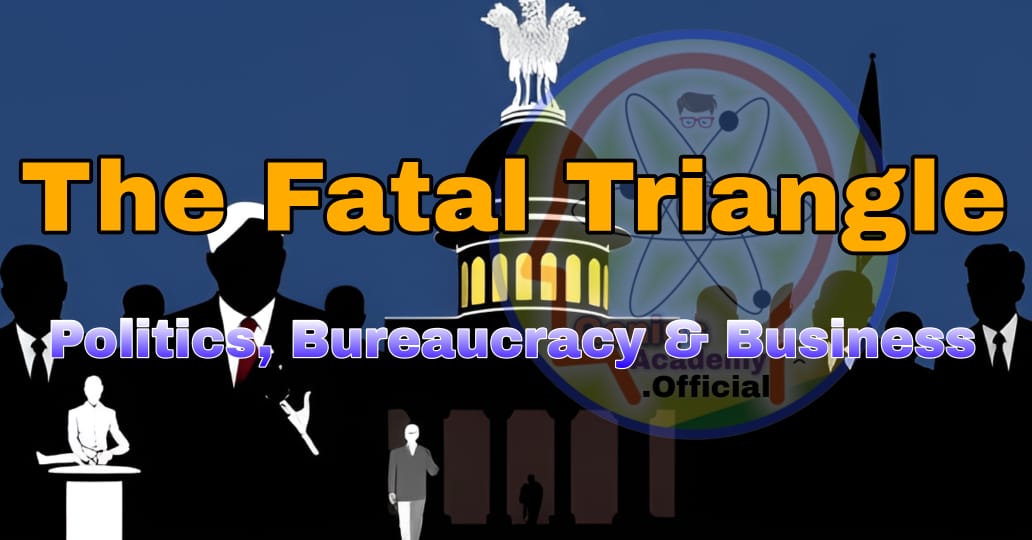The Fatal Triangle : Politics, Bureaucracy, and Business
The interaction between politics, bureaucracy, and business in India creates a complex yet influential nexus that governs much of the country’s policy, economic landscape, and governance structure. While collaboration among these entities is essential for the nation’s progress, their convergence often leads to unethical practices, corruption, and exploitation. This “fatal triangle” can undermine democratic principles, erode public trust, and perpetuate inequality. Understanding this nexus is vital for identifying the challenges it poses and the reforms required to restore integrity in governance.
Politics plays a pivotal role in shaping the dynamics of this triangle. Politicians wield immense influence over bureaucrats and businesses, using their position to secure campaign funds and political favors. Businesses, in turn, rely on political patronage for securing contracts, licenses, and favorable policies. Bureaucrats, often acting as intermediaries, implement the policies crafted by politicians and, at times, align with business interests for personal gains. This triangular relationship has often resulted in scandals, exposing systemic flaws. For instance, the 2G spectrum allocation scam and the coal block allocation scam highlighted how political leaders and bureaucrats manipulated laws to benefit specific business groups, causing massive public losses.
One of the critical issues in this nexus is the undue influence businesses have over politics. In a democracy, corporate funding of political campaigns is meant to be transparent, but in India, opacity persists. The introduction of electoral bonds in 2017 aimed to bring transparency to political donations. However, the scheme has been criticized for its lack of accountability, as donors’ identities remain undisclosed, creating a channel for businesses to discreetly influence policymaking. This concentration of corporate power undermines democratic principles, leading to policies that prioritize profit over public welfare. For instance, allegations of favoritism in awarding contracts for infrastructure projects to select corporations have raised concerns about equity and competition.
Bureaucracy, regarded as the “steel frame” of Indian governance, is equally integral to this triangle. However, bureaucrats are often caught in the crossfire of political and business interests. They are tasked with implementing government policies, but political interference frequently compromises their autonomy. Bureaucratic corruption, whether in the form of bribery, favoritism, or inefficiency, exacerbates the problem. The Punjab National Bank fraud involving Nirav Modi is a stark reminder of how systemic failures within the bureaucracy, compounded by political and business pressures, can lead to significant economic losses.
The misuse of regulatory mechanisms by bureaucrats in collusion with politicians and businesses further aggravates the situation. For instance, in the Sahara-SEBI dispute, regulatory loopholes allowed the Sahara Group to defraud millions of investors. Such cases highlight the ethical lapses and inefficiencies that plague India’s administrative system. These failures often arise from a lack of stringent oversight and accountability mechanisms, enabling corrupt practices to flourish.
The business sector, while vital for economic growth, also has its share of ethical concerns. Many large corporations exploit their influence over politics and bureaucracy to secure undue advantages, often at the expense of smaller players and public welfare. The Chanda Kochhar case, where the former CEO of ICICI Bank allegedly misused her position to benefit a company linked to her husband, underscores the pervasive nature of corporate misconduct. Such instances reveal how businesses, when unchecked, can undermine the integrity of governance systems and perpetuate inequality.
The implications of this nexus are profound and far-reaching. The erosion of public trust is one of the most significant consequences. When scandals involving the misuse of public funds or favoritism come to light, citizens lose faith in the government’s ability to act in their best interest. Moreover, this nexus often leads to economic inequality, as policies tailored to benefit large corporations widen the wealth gap between the rich and the poor. For example, while big businesses enjoy tax breaks and subsidies, small and medium enterprises struggle to compete on an uneven playing field.
Another critical concern is policy paralysis and inefficiency. Political interference and bureaucratic corruption can delay decision-making and hinder the effective implementation of policies. Stalled infrastructure projects, often a result of bureaucratic red tape or political favoritism, harm economic growth and public welfare. Furthermore, the weakening of democratic institutions is a severe consequence of this nexus. When businesses influence election outcomes through funding, they indirectly control policymaking, undermining the democratic process and prioritizing corporate interests over public welfare.
The environmental and social consequences of this triangle are equally alarming. Large-scale industrial projects, often approved without adequate scrutiny, lead to environmental degradation and social unrest. For instance, the clearance of mining projects in ecologically sensitive areas, despite protests from local communities, reflects the prioritization of profit over environmental and social concerns.
Addressing the challenges posed by this nexus requires a multi-faceted approach. Transparency and accountability must be prioritized in governance. Stricter laws on campaign financing, including mandatory disclosure of electoral bond transactions, can reduce the undue influence of businesses on politics. Similarly, bureaucratic appointments must be transparent and merit-based to limit political interference. Strengthening oversight mechanisms is another crucial step. Independent institutions like the Lokpal and Central Vigilance Commission must be empowered to investigate corruption cases involving politicians, bureaucrats, and businesses. Swift judicial action in prosecuting offenders can serve as a strong deterrent against misconduct.
Corporate governance reforms are equally essential. Businesses must adopt ethical practices and adhere to principles of corporate social responsibility. Regulatory bodies like SEBI should enforce stricter compliance standards to prevent fraud and ensure transparency. Additionally, a robust civil society and free press play a crucial role in exposing corruption and holding the powerful accountable. Investigative journalism, such as the reporting on the Panama Papers, serves as a vital check on the misuse of power by the nexus.
Public participation in governance can also help mitigate the influence of this triangle. Engaging citizens in decision-making processes, such as participatory budgeting and public consultations, ensures that policies reflect the interests of the people rather than vested interests. Moreover, adopting digital platforms for governance can reduce human discretion and corruption. Initiatives like the Government e-Marketplace (GeM) for procurement and Direct Benefit Transfer (DBT) for welfare schemes have demonstrated success in curbing leakages and favoritism.
India’s Right to Information (RTI) Act, enacted in 2005, is a powerful tool for ensuring transparency and accountability. By enabling citizens to demand information from the government, the RTI Act has exposed numerous cases of corruption and inefficiency. For instance, RTI queries revealed irregularities in the allocation of coal blocks, leading to the unearthing of the coal scam. However, recent amendments to the RTI Act, perceived as diluting its efficacy, underscore the ongoing struggle for transparency and accountability.
The intersection of politics, bureaucracy, and business holds immense potential to drive India’s progress if it is based on integrity and shared objectives. However, when this relationship is subverted for personal gain, it becomes a fatal nexus that erodes democratic values and economic justice. Comprehensive reforms are essential to dismantle this nexus and restore public trust in governance.
By empowering institutions, enforcing strict anti-corruption laws, and encouraging civic participation, India can transform this triangle into a cornerstone of inclusive and sustainable development. In doing so, it will uphold the principles of democracy and ensure that governance truly serves the people. Only then can the nation realize its vision of equitable growth and social justice, free from the clutches of vested interests.
Article
The Fatal Triangle : Politics, Bureaucracy, and Business
The interaction between politics, bureaucracy, and business forms a complex nexus that profoundly influences governance and development in any society. In India, this triangle often becomes a source of systemic corruption and inefficiency, undermining public trust in institutions. While a robust collaboration between these entities is essential for policy formulation, implementation, and economic growth, the growing evidence of their collusion for vested interests has created a dangerous imbalance, compromising the welfare of ordinary citizens. This essay examines the intricate dynamics of this “fatal triangle,” its implications for India, and possible remedies to ensure transparency and accountability.
(1) The Triad’s Influence in India
(2) Political Influence and Its Consequences
(3) Bureaucratic Complicity
(4) Business Interests and Ethical Concerns
(5) Implications of the Fatal Triangle
(i) Erosion of Public Trust:
(ii) Economic Inequality:
(iii) Policy Paralysis and Inefficiency:
(iv) Weakening of Democratic Institutions:
(iv) Harm to the Environment and Social Fabric:
Addressing the Challenge
● Transparency and Accountability:
● Strengthening Oversight Mechanisms:
● Corporate Governance Reforms:
● Civil Society and Media Vigilance:
● Public Participation:
● Technology for Transparency:
_

